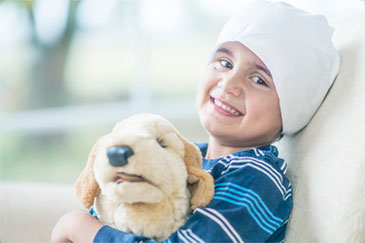- Home
- Research & Data
- POGONIS – Childhood Cancer Database
POGONIS – Childhood Cancer Database
POGONIS (Pediatric Oncology Group of Ontario Networked Information System) is an active, population-based database of all children and adolescents with cancer, diagnosed and/or treated in a specialized childhood cancer program in Ontario.
Our innovative database contains detailed clinical information and specifics about children’s diagnosis, treatment, complications and long-term outcomes. Read our statement of purpose to learn more about how we protect and use patient data.
POGONIS is actively used by POGO and our partners for cancer surveillance, research, decision-making, system and program planning and evaluation, and policy advice.
POGONIS is Ontario’s active childhood cancer registry and database
The benefits of POGONIS to our hospital partners
Each of the five specialized childhood cancer programs across Ontario feeds data on the children they care for into POGONIS and are able to use POGONIS to track their own statistics regarding patient volumes and service output. In Ontario, POGONIS is a source of reliable, validated data used to monitor:
- The incidence and prevalence of childhood cancer
- The need for cancer care for children and youth
- The nature and specifics of childhood cancer treatment
- Patient outcomes
- Long-term effects of childhood cancer and its treatment
- Health service utilization and system performance
Using POGONIS for program planning across the childhood cancer system
POGONIS enables knowledge transfer and facilitates the data-driven development of best practices and quality improvements for the childhood cancer care system. Using POGONIS, we can precisely estimate and accurately project the incidence of childhood cancer in Ontario; plan new initiatives and determine staffing requirements to provide care in strategic locations across the province; and share information with the Ministry of Health and other planning bodies. The value and utility of POGONIS data contribute greatly to our realization of the childhood cancer care system goals and objectives established in the Childhood Cancer Care Plan.
How POGONIS contributes to research
The POGO childhood cancer registry, POGONIS, is an unparalleled resource for pediatric cancer research. The results of projects generated from POGO’s registry will have immediate and lasting impact on the care of Ontario’s children with cancer, as well as that of children around the globe – both those who are newly diagnosed and the growing population of long-term survivors.
– Dr. Paul Nathan, Pediatric Oncologist, The Hospital for Sick Children
POGONIS is the engine driving childhood cancer research activity by POGO and our external research partners. It provides essential data for research studies, particularly population-based research. As POGONIS has captured data on a unique population over a long period of time, POGO and other researchers can conduct research with a breadth and scope that is unparalleled elsewhere. What we’ve learned about childhood cancer care in Ontario is applicable to health systems across Canada and around the world.
POGONIS Data Nomenclature
The POGONIS Nomenclature and Diagnostic Classification system is mapped to the International Classification of Childhood Cancer (ICCC) system and the International Classification of Diseases for Oncology, 3rd Edition (ICD-O-3). This facilitates comparison with other national and international childhood cancer databases.
POGO values privacy and protects the personal health information (PHI) of children and families.
We welcome requests for the use of the childhood cancer data in POGONIS and our other POGO personal health information (PHI) data holdings for analysis and/or research purposes.
Related Articles
2024 POGO Symposium Speakers Share Insights from their Sessions
February 21, 2025
The 2024 POGO Multidisciplinary Symposium on Childhood Cancer headed to Niagara-on-the-Lake, where…
Bruce Power and supplier partners donate $100,000 to Pediatric Oncology Group of Ontario
January 21, 2025
Originally published on the Bruce Power website, September 25, 2024


YOU can be a champion for kids with cancer!
With your help, we will ensure that kids and youth with cancer, their families and survivors of childhood cancer have equitable access to the best care for the best possible outcomes.


